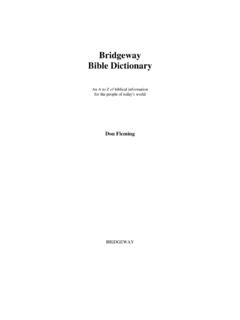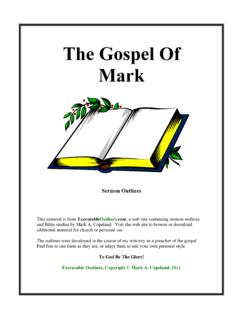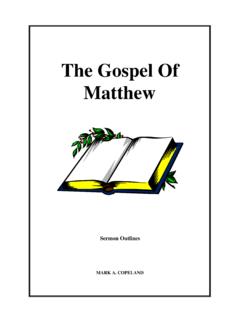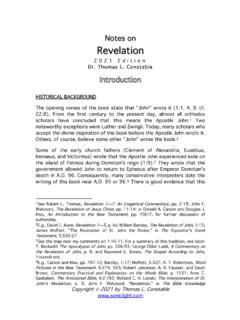Transcription of Bridgeway Bible Commentary
1 Bridgeway Bible Commentary A running explanation of the biblical text for the people of today's world Don Fleming Bridgeway Bridgeway Bible Commentary Don Fleming 1988, 1994, 2005 First published in an 8-volume set as Bridge Bible Handbooks 1988 Reprinted 1990, 1992 First published as Bridge Bible Commentary 1994 Reprinted 1997, 2001, 2003 First published as Bridgeway Bible Commentary 2005 ISBN 0 947342 72 9 All Rights Reserved Bridgeway Publications GPO Box 2547 Brisbane 4001 Australia Contents Preface Genesis Exodus Leviticus Numbers Deuteronomy Joshua Judges
2 Ruth 1 Samuel 2 Samuel 1 Kings 2 Kings 1 Chronicles 2 Chronicles Ezra Nehemiah Esther Job Psalms Proverbs Ecclesiastes Song of Songs Old Testament Prophecy Isaiah Jeremiah Lamentations Ezekiel Daniel Hosea Joel Amos Obadiah
3 Jonah Micah Nahum Habakkuk Zephaniah Haggai Zechariah Malachi The New Testament World Introduction to the four Gospels Jesus and the Kingdom Index to the four Gospels The four Gospels Acts The post-Acts Period Romans 1 Corinthians 2 Corinthians Galatians Ephesians Philippians Colossians 1 Thessalonians 2 Thessalonians 1 Timothy 2 Timothy Titus Philemon Hebrews
4 James 1 Peter 2 Peter 1 John 2 John 3 John Jude Revelation Preface The origins of this Commentary go back to my missionary years in Thailand, when I began writing a few books in the Thai language to help local people understand the Scriptures. The result, after many years, was a series of fifteen mini-commentaries on the Thai Bible . Although the success of the books in Thai was due largely to the lack of available alternatives, news of the books spread, and it was suggested that I prepare an English equivalent for use in other countries. Over some years the fifteen-volume series was produced in English, but by this time I had written several other books and their production was scattered over a variety of countries.
5 When Bridgeway Publications in Australia undertook a project to republish all these books in a new format, the fifteen volumes were revised and reissued in eight volumes under the series title, Bridge Bible Handbooks. Those eight books are now combined into the one-volume Bridgeway Bible Commentary , which is a companion in size, style and format to the Bridgeway Bible Dictionary, an A to Z of biblical information. The eight Handbooks were dedicated to people who, in different ways, had a significant influence in my life and ministry. Since the present volume is not a new work but a reformatted (and in parts revised) version of the eight Handbooks, no new dedication attaches to it. Instead I am pleased to acknowledge again my indebtedness to those to whom the earlier editions were dedicated. Book 1 Philip and Pat Juler Book 2 Chun Kertyoo Book 3 Reg and Marjorie Vines Book 4 David Clines Book 5 John and Grace Robertson Book 6 Bob and Vic McCallum Book 7 Chue Petnamngern Book 8 Vic and Jean Fleming In the present book, as in my other books, my aim is to provide biblical reference material that bridges two gaps at the same time.
6 First, I want to bridge the gap in time and culture between the world of the Bible and the world of today. Second, I want to bridge the gap between the technical reference works and the non-technical reader. Above all, my desire is to produce books that will encourage people to read the Bible . Though labelled a Commentary , this volume is not a word-by-word or verse-by-verse technical reference book. But neither is it a survey that flies over the top of the various biblical books without touching the text. Perhaps running Commentary would be a more appropriate description. My suggestion is that instead of trying to dig deep or squeeze lessons from the Bible , we relax a little, try to understand what each book is saying, and then let the Bible do whatever it wants to do. Let the Bible speak for itself which is the title of a practical handbook I have written on how we might teach the Bible in plain language. The aim of such teaching, like the aim of this Commentary , is not to exhaust the meaning of the text, nor to force the text to fit our schemes of interpretation, but to provide enough background and comment to enable people to read with understanding.
7 The Bible has its own power as God s Word, and is an authoritative standard for teaching truth, correcting error, and instructing in right living. It is living and active, and has its own way of making its message relevant to us as readers, but it can do so only if first we understand it. This Commentary is designed to help us understand what the biblical writers might have meant, and to do so in such a way that we might readily see the relevance of the ancient Word to present-day living. And once we have the understanding, we have an obligation to act upon it. Don Fleming GenesisINTRODUCTION The name Genesis means origin or beginning and is a suitable name for the book of the Bible that speaks of the origins of the universe, of the human race, of human sin and of God s way of salvation. Though it stands at the beginning of our Bibles as an individual book, it was originally part of a much larger book commonly called the Pentateuch. The Pentateuch Hebrew, the mother tongue of the Israelite people, was the original language of the Old Testament.
8 During the third century BC this Hebrew Old Testament was translated into Greek, the translation being known as the Septuagint (often written LXX), after the seventy who translated it. From these translators we have borrowed the word Pentateuch as a name for the first five books of the Bible (from two Greek words, penta, meaning five , and teuchos, meaning a volume ). Originally the five books were one, but they were put into their present five-volume form so that they could fit conveniently on to five scrolls. The Hebrews referred to the whole Pentateuch simply as the law (2 Chron 17:9; Neh 8:1-3,18; Matt 5:17-19; 11:13; 12:5; Luke 24:44). Age-old tradition, both Hebrew and Christian, recognizes Moses as the author of the Pentateuch (2 Chron 35:12; Neh 8:1; 13:1; Dan 9:11; Mark 12:26; Luke 16:29-31; Acts 15:21), though the Pentateuch itself does not say who wrote it. Nevertheless, it mentions Moses literary activity. He wrote down the law that God gave to Israel (Exod 24:4; 34:27; Deut 31:9,24), he kept records of Israel s history (Exod 17:14; Num 33:2) and he wrote poems and songs (Exod 15:1; Deut 1:22,30).
9 As leader of the nation, Moses was no doubt familiar with the family records, traditional stories and ancient songs that people of former generations had preserved and handed down, whether by word of mouth or in written form (cf. Gen 5:1; 6:9; 10:1; 11:10,27). Like other writers, he would have used material from various sources, especially in writing about places and events outside his own experience (Gen 26:33; 35:19-20; 47:26; Num 21:14). In addition he had direct contact with God and received divine revelations (Exod 3:4-6; 33:9-11; Deut 34:10). Under the guiding hand of God, all this material was put together to produce what we call the five books of Moses. People who study biblical documents have at times suggested that the Pentateuch reached its final form much later than the time of Moses. They base their ideas on the similarities and contrasts they see in such things as narrative accounts, the names used for God, usage of certain words and phrases, and details of Israel s religious system.
10 Some even see a number of independent documents that were later combined into one. Amid all the discussion that has taken place concerning these matters, people have sometimes forgotten that the important issue is not how the Pentateuch was written, but what it means. And in both the Hebrew and Christian Bibles it stands as a book whose unity is clear and whose message is the living Word of God (Neh 8:8,14; 9:3; John 5:39,46; Acts 28:23). The book of Genesis Those who gave the name Genesis to the first book of the Bible were the translators of the Pentateuch. The ancient Hebrews called the book by its opening words, In the beginning . The book s chief concern, however, is not with physical origins, but with the relationship God desires to have with the people who inhabit his earth. Adam and Eve, though sinless when created, fell into sin, and the evil consequences of their sin passed on to the human race descended from them. Rebellious humanity deserved, and received, God s judgment, but that judgment was always mixed with mercy.





